|
|
|
Sort Order |
|
|
|
Items / Page
|
|
|
|
|
|
|
| Srl | Item |
| 1 |
ID:
126736
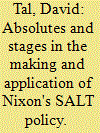

|
|
|
|
|
| Publication |
2013.
|
| Summary/Abstract |
President Richard Nixon and his National Security Adviser, Henry Kissinger took great pride in their success to achieve agreements on the limitation of Anti Ballistic Missiles and the Interim Agreement on Strategic Missiles with the Soviet Union. For Nixon, this agreement was not only an achievement that had been denied to his predecessor, it also seemingly represented the success of his own approach over that of his predecessors. Nixon-in tandem with Kissinger-intended to link arms control negotiations with the Soviet Union to the resolution of other political problems such as Vietnam, the Mideast, and Berlin. Through the employment of linkage, they hoped to make U.S. arms control policy part of Détente. However, Nixon was able to sign the "historic agreements" because his policy of linkage had in fact failed. It failed mainly because it was based on flawed assumptions and false premises. Thus, the historic success was possible precisely because Nixon had not actually made his arms control policy "distinct" from that of the Johnson Administration and its predecessors in his approach to strategic arms talks with the Soviet Union
|
|
|
|
|
|
|
|
|
|
|
|
|
|
|
|
| 2 |
ID:
132358
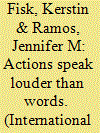

|
|
|
|
|
| Publication |
2014.
|
| Summary/Abstract |
How and to what extent is the preventive use of force becoming the future of foreign policy for states around the world? We explore the spread of preventive logic to increasing numbers of states and examine the degree to which an international norm toward preventive self-defense is cascading in the international system. Through content and comparative case study analysis, we investigate leaders' rhetoric and security policies concerning what we theorize is the key indicator of a country's emulation of the United States: assertion of the right to the unilateral, preventive use of force outside of its borders. Our evidence indicates that there has been a shift away from the established international norm-which considers the use of preventive force illegal and illegitimate-toward growing acceptance of unilateral preventive strategies, a shift largely propelled by the precedents set by the United States in the war in Iraq and its use of unmanned aerial vehicles (UAVs or drones) in the global war on terror. Our findings also reveal that some states are applying the strategy of preventive self-defense beyond the use of UAVs for targeted killings to the extreme contingency plan for nuclear war. We conclude by discussing possibilities for further research and considering the implications of this phenomenon.
|
|
|
|
|
|
|
|
|
|
|
|
|
|
|
|
| 3 |
ID:
130331
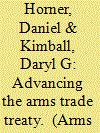

|
|
|
|
|
| Publication |
2014.
|
| Summary/Abstract |
Thomas Countryman took office as assistant secretary of state for international security and nonproliferation on September 27, 2011. He joined the U.S. Foreign Service in 1982. He was lead negotiator for the United States in the talks that produced the Arms Trade Treaty (ATT) last year. Arms Control Today spoke with Countryman in his office on March 12. Countryman was joined by William Malzahn, senior coordinator in the Office of Conventional Arms Threat Reduction. In the interview, Countryman explained the reasons that the United States signed the ATT, addressed domestic criticism of the pact, and looked ahead to the challenges that the treaty faces.
|
|
|
|
|
|
|
|
|
|
|
|
|
|
|
|
| 4 |
ID:
128127
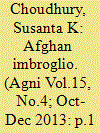

|
|
|
|
|
| Publication |
2013.
|
| Summary/Abstract |
The 11 September attacks in the United States caused NATO to invoke article 5 of the NATO charter for the first time in history. The article states that an attack on any member shall be considered to be attack on all. The invocation was confirmed on 4 October 2001 when NATO determined that the attacks were indeed eligible under the terms of North Atlantic Treaty Organisation, Eagle Assist and Operation Active Endeavour, a naval operation in the Mediterranean sea and is designed to prevent the movement of terrorists or weapons of mass destruction as well as to enhance the security of shipping the general which began on 4 October 2001.
|
|
|
|
|
|
|
|
|
|
|
|
|
|
|
|
| 5 |
ID:
128133


|
|
|
|
|
| Publication |
2013.
|
| Summary/Abstract |
On June 18 as Afghan president Hamid Karzai and the high peace council prepared to start talks independently with the Taliban in Doha, Emirate of Qatar, the United States after playing hide and seek and holding undisclosed intermittent talks in Doha for more than a year announced that it will be opening direct talks with Taliban leaders within days. At the time of writing, these talks have not begun, but a US delegation has arrived in Doha and they expect to begin talking soon
|
|
|
|
|
|
|
|
|
|
|
|
|
|
|
|
| 6 |
ID:
128388
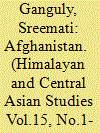

|
|
|
|
|
| Publication |
2011.
|
| Summary/Abstract |
In the context of conventional notion of Afghanistan's foreign policy strategy, two countries are accorded the most prominent status- the U.S. and Pakistan. Russia, on the other hand, shares a unique relationship with Afghanistan. The role of the buffer state, as played out by Afghanistan, during the 19"' century, halted Russian adventure towards ' South Asia, and Russian invasion of Afghanistan proved to be so much of a miscalculated affair as the misadventure led to the collapse of the Soviet Union itself. But even now, Russia has a great stake in Afghanistan's stability and is still considered to be a stabilizing factor in Afghanistan's security scenario. This paper analyzes the different phases of Russian involvement in Afghanistan in t international strategic environment.
|
|
|
|
|
|
|
|
|
|
|
|
|
|
|
|
| 7 |
ID:
133369
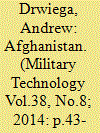

|
|
|
|
|
| Publication |
2014.
|
| Summary/Abstract |
A complete analysis of ISAF's combat commitment within Afghanistan is impossible to summaries in a single article; but, by focusing on specific campaign factors, some lessons for the future can be discerned while a little more time remains with boots on the ground.
|
|
|
|
|
|
|
|
|
|
|
|
|
|
|
|
| 8 |
ID:
130888
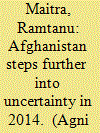

|
|
|
|
|
| Publication |
2014.
|
| Summary/Abstract |
2014 was long anticipated as the year of transition and ushering in of hope for Afghanistan. Three months of this important year are already behind us and, betraying earlier expectations, afghans continue to face stark uncertainties.
|
|
|
|
|
|
|
|
|
|
|
|
|
|
|
|
| 9 |
ID:
133161
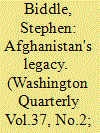

|
|
|
|
|
| Publication |
2014.
|
| Summary/Abstract |
The war in Afghanistan is not over. Nor is it ending any time soon. The U.S. role may end in 2016, in whole or in part, but the war will continue-and its ultimate outcome is very much in doubt. The conflict is now stalemated militarily, and will likely stay that way as long as outsiders pay the large bills needed to keep the Afghan National Security Forces (ANSF) in the field and fighting. The war will thus grind onward until this funding dries up or the two sides negotiate a compromise settlement, neither of which is imminent. Depending on how any talks unfold, historians in 2050 could thus look back on this war as a costly but tolerable outcome for the West, as a wasteful disaster, or as something in between; for now, all we know for sure is that it continues.
|
|
|
|
|
|
|
|
|
|
|
|
|
|
|
|
| 10 |
ID:
131852
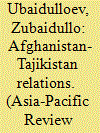

|
|
|
|
|
| Publication |
2014.
|
| Summary/Abstract |
This article attempts to touch upon the relations between Afghanistan and Tajikistan, two neighboring countries, from the historical perspective and the current period. The article analyses the history of Afghanistan-Tajikistan relations during and after the Soviet era, especially during the Afghan Mujahideen's struggle against the Soviet occupational army and Taliban regime in Afghanistan, the Tajikistan civil war of 1992-1997, and after September 11, 2001. In addition, the issues of the ethnic Tajiks in Afghanistan, the violent and vulnerable Tajik-Afghan border, the withdrawal of NATO troops from Afghanistan in 2014 and its impact on Afghanistan-Tajikistan relations, and the new phase of economic relations and an effective cooperation between the both countries are discussed. The article tries to fill the gaps within the body of existing literature and understanding concerning the topic.
|
|
|
|
|
|
|
|
|
|
|
|
|
|
|
|
| 11 |
ID:
132034
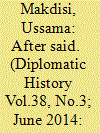

|
|
|
|
|
| Publication |
2014.
|
| Summary/Abstract |
The question of how to represent the U.S. role in the Middle East brings to the fore the question that Edward Said first raised in 1978 in Orientalism about the nature of American understandings of the Middle East. More than three decades after the publication of his book, Said's criticism of Orientalist scholarship-and his accompanying plea for a secular humanistic interpretation to replace it-remain both topical and enigmatic. It is one thing to criticize American representations of foreign cultures; it is an entirely different matter to study American engagements with them. These are by no means unrelated endeavors, but by the same token, they entail very different conceptions of what constitutes a field of inquiry and how to go about studying it comprehensively. The recent emergence of a more critical scholarship of America and the Middle East, therefore, begs the question of whether it is possible to write a history that takes both the Americans and Arabs equally seriously despite the prevailing political climate, and ultimately what kind of methodology this might entail for the rewriting of U.S.-Arab relations, and more broadly, American involvement in the world.
|
|
|
|
|
|
|
|
|
|
|
|
|
|
|
|
| 12 |
ID:
130115
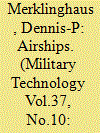

|
|
|
|
|
| Publication |
2013.
|
| Summary/Abstract |
Since the Civil War, when Union Soldiers utilised hot air balloons to serve as a surveillance platform, lighter than air technology has been a part of the military's inventory. As US forces began a troop surge in Afghanistan while maintaining security in Iraq the need to provide soldiers with a persistent view of the battlefield was paramount.
The primary goal of Millennium Airship is to design, engineer, build, market and operate the world's first Heavy-Lift Air Vehicle that is lighter-than-air, all-weather, amphibious semi-rigid, multi-mission, hybrid. The key feature of this aircraft will be in that it is so manoeuvrable that it can operate in and out of virtually anywhere (land or sea) where there is enough space to accommodate its size.
|
|
|
|
|
|
|
|
|
|
|
|
|
|
|
|
| 13 |
ID:
132511
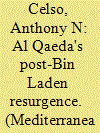

|
|
|
|
|
| Publication |
2014.
|
| Summary/Abstract |
The Barack Obama administration's May 2013 assessment of al Qaeda's weakness and fracturing in the post-bin Laden era has been greeted with indignation by both liberals and conservatives. They believe al Qaeda is stronger than ever in the wake of the Arab Spring. These critics, however, misunderstand the network's dysfunctional direction. Al Qaeda's "resurgence" is likely to lead to its failure. The argument proceeds on four levels: (1) the dramatic growth of the al Qaeda network masks its internal weakness and organizational splintering; (2) the Arab Spring has led to a burst of al Qaeda activism that is likely to undermine its jihadist cause; (3) al Qaeda's fragmentation and its multiple trajectories in the post-9/ 11 era violate bin Laden's original intent and are beyond al Qaeda Central's direction; and (4) the dysfunctional nature of al Qaeda's ideology and its excessive reliance on takfiri violence is paradoxically a source of both persistence and failure.
|
|
|
|
|
|
|
|
|
|
|
|
|
|
|
|
| 14 |
ID:
130074
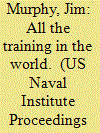

|
|
|
|
|
| Publication |
2014.
|
| Summary/Abstract |
My opinion has not changed-although my explanation might-and this is an issue that continues to plague the armed forces. The Navy has even embraced sub-themes for Sexual Assault Awareness Month (SAAM); for the first half of April, the message is "Live Our Values." That was my intended meaning: Sexual assault is contrary to our core values.
My friend's criticism was part of a cordial, yet emotionally driven discussion, and it was enlightening. It was accompanied by the story of a young sailor who faced blatant sexual harassment from her leading petty officer.
That sailor was subjected to repeated inappropriate comments in public, and more graphic comments in smaller groups. These remarks were overheard by a chief petty officer who asked the junior sailor if she wanted him to talk to the petty officer. Harassment and assault are two very different things, but a lax attitude toward the former diminishes an atmosphere of respect, the overarching theme of SAAM 2014.
|
|
|
|
|
|
|
|
|
|
|
|
|
|
|
|
| 15 |
ID:
127061
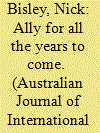

|
|
|
|
|
| Publication |
2013.
|
| Summary/Abstract |
In 2011, Australia communicated a clear choice about its strategic future. It would continue to cleave tightly to the US alliance, expand its military links and work to advance the USA's conception of regional order. Given its economic interests, why has Australia bound itself to the US alliance? What lies behind this strong commitment and what would it take for Australia to change its relationship with the USA? This article presents an analysis of the current state of the US-Australia alliance and argues that Canberra's pursuit of close relations with the USA reflects the interaction of a rational calculation of the costs and benefits of the alliance with a set of resolutely political factors that have produced the current policy setting. The article first assesses the security cost and benefit behind the alliance. It then argues that the move also derives from the strong domestic support for the US alliance, a sharpened sense that China's rise was generating regional instability that only the US primacy could manage and the realisation that the economic fallout of such a move would be minimal. It concludes with a brief reflection on what it might take to change the current policy settings.
|
|
|
|
|
|
|
|
|
|
|
|
|
|
|
|
| 16 |
ID:
130544
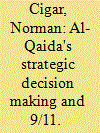

|
|
|
|
|
| Publication |
2014.
|
| Summary/Abstract |
As the united states draws down its military presence in Afghanistan, it is appropriate to revisit how the war was ignited and , in particular, Al-Qaida's role in that process. An understanding of Al-Qaida's thinking in preparing and executing this operations provides helpful insight into its decision making system and into its planning process in relation to both overall policy and, specifically, to its decision to launch the 9/11 operation in 2001.
|
|
|
|
|
|
|
|
|
|
|
|
|
|
|
|
| 17 |
ID:
131492
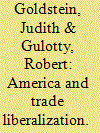

|
|
|
|
|
| Publication |
2014.
|
| Summary/Abstract |
Among scholars, delegation of power to the US president in 1934 is widely believed to have been a necessary requisite for tariff reductions in ensuing years. According to conventional wisdom, delegation to the president sheltered Congress from constituent pressure thereby facilitating the opening of the US economy and the emergence of the United States as a world power. This article suggests a revision to our understanding of just how that occurred. Through a close study of the US tariff schedule between 1928 and 1964, focusing on highly protected products, we examine which products were subject to liberalization and at what time. After 1934, delegation led to a change in trade policy, not because Congress gave up their constitutional prerogative in this domain but because presidents were able to target the potential economic dislocation that derives from import competition to avoid the creation of a congressional majority willing to halt the trade agreements program.
|
|
|
|
|
|
|
|
|
|
|
|
|
|
|
|
| 18 |
ID:
133658
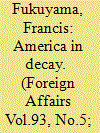

|
|
|
|
|
| Publication |
2014.
|
| Summary/Abstract |
The problems with American politics today stem from the basic design of U.S. political institutions, exacerbated by increasingly hostile polarization. Unfortunately, absent some sort of major external shock, the decay is likely to continue for the foreseeable future.
The creation of the U.S. Forest Service at the turn of the twentieth century was the premier example of American state building during the Progressive Era. Prior to the passage of the Pendleton Act in 1883, public offices in the United States had been allocated by political parties on the basis of patronage. The Forest Service, in contrast, was the prototype of a new model of merit-based bureaucracy. It was staffed with university-educated agronomists and foresters chosen on the basis of competence and technical expertise, and its defining struggle was the successful effort by its initial leader, Gifford Pinchot, to secure bureaucratic autonomy and escape routine interference by Congress. At the time, the idea that forestry professionals, rather than politicians, should manage public lands and handle the department's staffing was revolutionary, but it was vindicated by the service's impressive performance. Several major academic studies have treated its early decades as a classic case of successful public administration.
|
|
|
|
|
|
|
|
|
|
|
|
|
|
|
|
| 19 |
ID:
128598
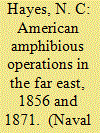

|
|
|
|
|
| Publication |
2013.
|
| Summary/Abstract |
The author examines two little known small scale amphibious operations from the mid 19th century, which still have some relevance to operations today.
|
|
|
|
|
|
|
|
|
|
|
|
|
|
|
|
| 20 |
ID:
130871
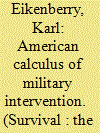

|
|
|
|
|
| Publication |
2014.
|
| Summary/Abstract |
The protracted campaigns in Afghanistan and Iraq have diminished America's appetite for waging wars to end tyranny or internal disorder in foreign lands. Military interventions have traditionally been a source of controversy in the United States. But America's appetite for the dispatch of armed forces has been diminished greatly by factors that have primarily emerged in the twenty-first century. These include, most painfully, the protracted campaigns in Afghanistan and Iraq that have made US political and military leaders more cautious about waging wars to end tyranny or internal disorder in foreign lands.
|
|
|
|
|
|
|
|
|
|
|
|
|
|
|
|
|
|
|
|
|